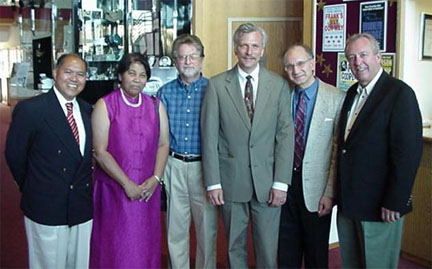Inside the
Summer Issue:
Winning $10,000
Isn't As Exciting As
Giving It Away
Fan Fare
Paul and
Vicki Silverman
Chapin Food Bank
in Eye of
Hurricane Charley
Physicians Team Up
to Seek Cure
to Hunger
Long Island
Songwriters Go Wild
About Harry
Tom Chapin's
Ever-Widening
Circle
Click to read
the Winter 2004 Issue
Click to read
the Fall 2003 Issue
Physicians Team Up to Seek Cure to Hunger
by Freddy S. Zalta
When Michael Altamura speaks about hunger and why he chose to get involved, you can hear the passion and frustration of a doctor who knows the cure but can't find the tools to set the healing in motion.
In 1991, Altamura, inspired after running in the annual "Harry Chapin Memorial Run Against Hunger," decided to do something more.
"I had always heard about CARE, The Freedom Nation, World Hunger Year and other groups," he said. "But there was no organization within the medical community devoted toward this cause."
On reflection and a commitment to action, Altamura, 56, set in motion "Physicians Against World Hunger" (PAWH), a non-profit grassroots group in Peekskill, NY, that raises money to fund anti-hunger projects across the world. To date, the volunteer-driven program has supported programs in El Salvador, Bolivia, Ghana, Eritrea, Haiti, Bangladesh, Kenya and Appalachia.
Initially, PAWH was comprised of Altamura and and a small group of volunteers. But as word began to spread within the medical community, others began to volunteer and to help coordinate a fundraising dinner. The annual fundraiser has been held every spring for the past seven years. This year, more than 500 supporters attended the event to fight hunger.
Since its founding, PAWH has raised thousands of dollars for the cause. The group has donated the bulk of its proceeds to a program called "Credit for Education" that provides financial credit to poor women at a reasonable interest rate so that they can invest in an individual business activity, make a profit and accumulate savings.

From left to right: Dr. Joseph Garcia, Dr. Shantha David, Dr. David Scuccimarra,
Mr. Timothy Dvorak, Dr. Michael Altamura and Dr. Thomas Lansen.
With the focus on poor women in primarily rural areas, Credit with Education addresses the root causes of poverty and hunger through a combination of informal education and small-scale lending.
Cash credit is an important tool for families trying to escape hunger and poverty. It is an especially meaningful resource for women in developing countries. Financial institutions typically neglect poor, rural women -- primarily because of their lack of collateral. As a result, financial services are often unavailable to women.
"The goal of PAWH is to expand a number of Credit with Education associations which we support throughout the world and to find a way of applying the same concept here at home," he added.
But credit and savings alone cannot provide poor women with all the tools for change. They must also have access to information about how to prevent malnutrition and illnesses. Education, when coupled with increased income, breaks the hunger cycle, noted Atamura.
"It has become clear that if we hope to put an end to chronic hunger then we must help poverty-stricken people become self-sufficient," he said. "What makes the Credit with Education program unique is the integration of delivery of services, which are key to the process of becoming self-sufficient." Altamura said he hoped one day there could be PAWH offices in other parts of the U.S. and maybe even around the world.
"It is hard to find someone who is dedicated enough to volunteer so much time and energy to this project," he said. "It has to be done in accordance to our standards, but we are willing to meet and discuss with anyone who is willing to expand our organization." If you'd like to volunteer or help support PAWH, contact Altamura via email at MJACRT@optonline.net
To donate to Physicians Against World Hunger, send a check or money order to:
PAWH
#2 Stowe Rd
Peekskill, NY 10566
Watch for the Next Issue of Circle! on December 7
